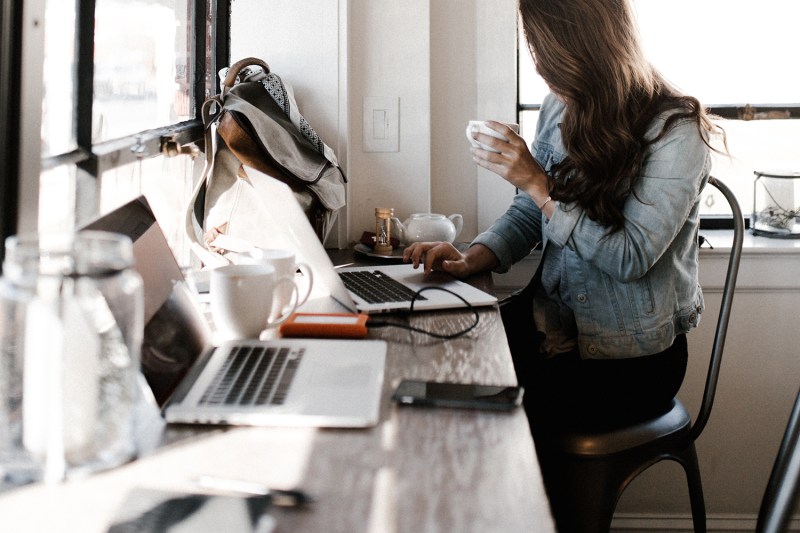If you visit a coffee shop at any point during the regular work week, you’re likely to see a small army of remote workers parked at the tables and counters, laptops open and fingers typing furiously. As the work-from-home and freelance populations continue to grow, the habit of using local cafes as alternative workspaces becomes more and more ingrained in modern culture.
However, some cafe owners object to the legion of screens occupying every surface and the tendency of laptop users to linger for hours (sometimes without making regular purchases to justify their use of valuable cafe real estate). The presence of computers in a coffee shop during the week may be a foregone conclusion at this point, but the cafe proprietors who want to limit laptops sometimes institute “no laptops” policies on Saturdays and Sundays. To their minds, policies like these will keep the cafes from becoming de facto co-working spaces and return them to their “original” purposes as gathering spots for friends and venues in which to enjoy a snack and a well-brewed cup of joe.

Of course, laptop bans on weekend days aren’t without their detractors; freelance workloads don’t often abide by a nine-to-five, Monday-to-Friday schedule, and “digital nomads” seeking ways to get work done on Saturdays and Sundays don’t appreciate these limitations. Arguments can be made (and are frequently made) both for and against no-laptops edicts, so we asked a group of baristas and freelancers to weigh in on the subject. According to them, these 3 points should be carefully considered by any cafe owner thinking about making laptops persona non grata over the weekend.
Forbidding customers from using laptops can cause major friction in the barista-customer dynamic.
As both a barista and a blogger who works from cafes, Pat Mills of Making Nice Coffee is abundantly familiar with coffee shops that prohibit laptop use on weekends and urges owners to consider the awkwardness that these rules can force upon the cafe employees tasked with enforcing them. “My old manager actually tried something like this. He felt that our cafe was more like a co-working space, so we trialed one Saturday of the month where no one could use laptops. What happened was that when any of us baristas would ask a customer [to stop using their laptop], it would begin a painful exchange. The customers were outraged. They’d paid for a drink and expected to be able to sit in peace and do their work. In the end, we just stopped doing it to avoid the arguments with the customers. That manager didn’t last long, by the way,” Mills tells us.
If a cafe does choose to ban laptops, it needs to make its policies clear.
Plenty of freelancers can understand why a cafe might institute a no-laptops-on-weekends policy … but when these venues lack clear signage and their anti-laptop rules come as a surprise to guests, said customers may view that as a lack of hospitality. “Most cafes don’t post their laptop policies in obvious places. When you walk into a cafe and see a few people on their laptops, you assume it’s a green light to work there — weekend or no weekend. There have been plenty of times that I’ve gone to a cafe to work, seen like 5 people on their laptops and assumed it’s OK — only to be booted just as my breakfast has arrived. When I asked if there was a sign that I missed, the sign is usually hidden behind a plant or in a not-so-obvious place. I think most ‘laptop people’ would love to abide by rules; we just need clear communication to know what the rules are,” explains freelance writer and “digital nomad” Alicia Butler.
Offering limited-time Wi-Fi access on weekends can help prevent laptop users from dominating the space.
For cafe owners who want to eliminate the lurking issue associated with laptop users, freelance tech writer Craig Anderson of Appliance Analysts has a solution to their concerns: “There’s a café near me that has a unique solution for handling laptops and freelancers. When you go there to grab a coffee or a snack, they give you a small slip with a unique Wi-Fi code. This code gives you Wi-Fi access for either 2 or 3 hours (depending on how much you ordered). As a freelancer, I’m completely on board with this. It keeps us honest and removes the worry over whether I’m overstaying my welcome at a café. The tactic works. The café is always buzzing with a mixture of laptop users and people chatting over coffee. It serves to encourage a community feel without isolating out the many freelancers and remote workers that want to take advantage of a great space to work.”



